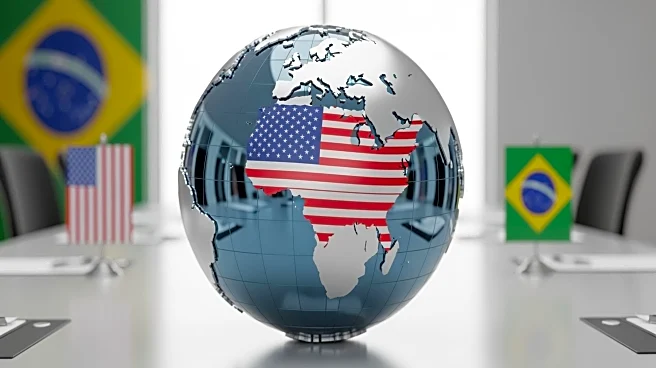What's Happening?
President Donald Trump and Brazilian President Luiz Inacio Lula da Silva have agreed to initiate immediate discussions to address the increased tariffs imposed by the U.S. on Brazilian goods. The meeting
took place on the sidelines of the ASEAN summit in Kuala Lumpur, Malaysia. In August, President Trump raised tariffs on most Brazilian imports to 50% from 10%, linking the decision to what he described as a 'witch hunt' against former Brazilian President Jair Bolsonaro. The U.S. also imposed sanctions on several Brazilian officials, including Supreme Court Justice Alexandre de Moraes, who was involved in Bolsonaro's trial. Lula criticized the tariff hike as a mistake, highlighting a $410 billion U.S. trade surplus with Brazil over the past 15 years. Brazil's Foreign Minister Mauro Vieira announced that negotiations would start immediately, with a meeting planned with the U.S. delegation.
Why It's Important?
The tariff increase has significant implications for both countries' economies and trade relations. For the U.S., higher tariffs on Brazilian goods have begun to reshape the global beef trade, leading to increased prices domestically and encouraging trade triangulation through third countries like Mexico. Meanwhile, Brazilian exports to China continue to thrive. Resolving the tariff dispute could stabilize trade relations and potentially benefit both nations economically. The negotiations could lead to a reduction in trade barriers, fostering better diplomatic ties and economic cooperation between the U.S. and Brazil.
What's Next?
Negotiations between the U.S. and Brazil are set to begin immediately, with both countries aiming to establish a schedule and identify sectors for discussion. Brazil has requested the suspension of tariffs during the negotiation process, although it is unclear if the U.S. has agreed to this request. The Brazilian Foreign Minister expressed hope for concluding bilateral negotiations addressing the tariffs in the near future, potentially within weeks. The outcome of these talks could influence global trade dynamics, particularly in the beef industry, and impact diplomatic relations between the two nations.
Beyond the Headlines
The tariff dispute highlights broader geopolitical tensions and the impact of domestic political issues on international trade. The U.S. sanctions against Brazilian officials underscore the intersection of legal and political dimensions in trade policy. The situation also reflects the complexities of balancing economic interests with political considerations, as both countries navigate the implications of the tariffs and sanctions.











